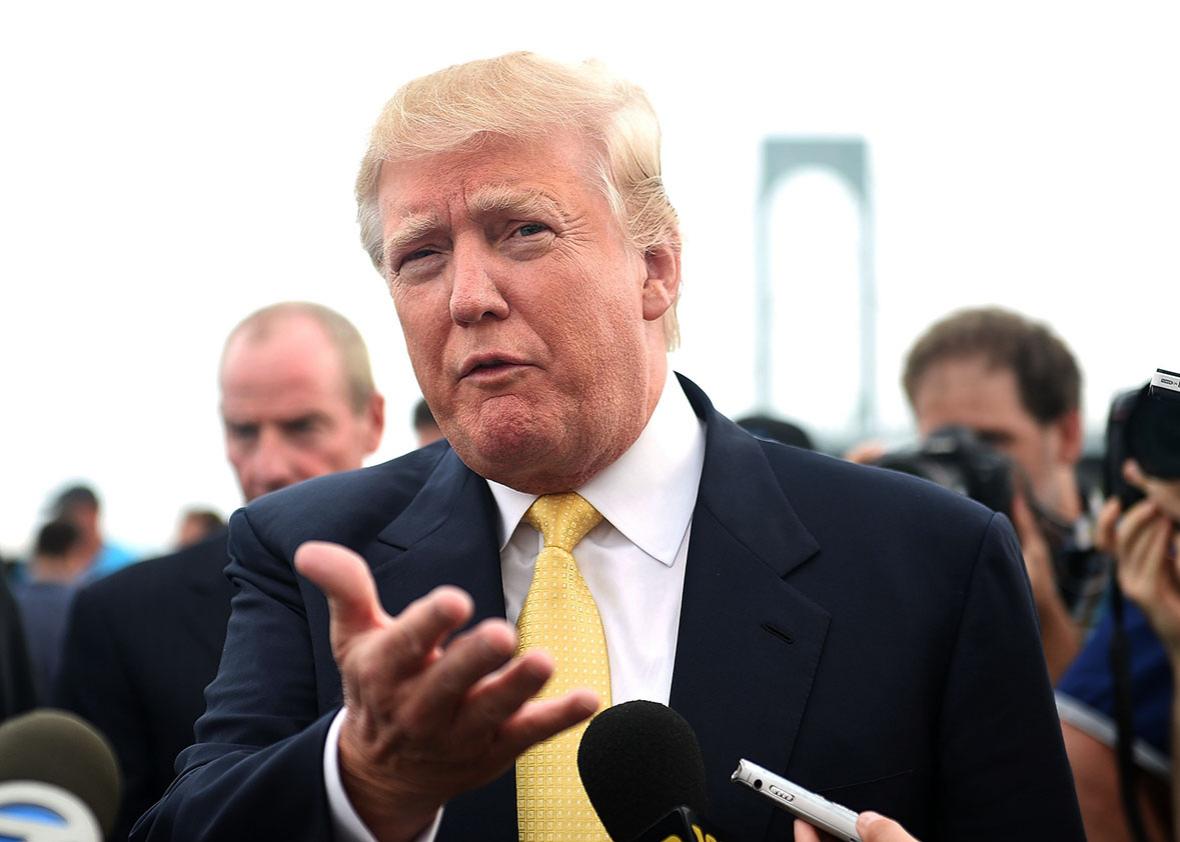My favorite Trumpism is “nobody really knows.” He says it all the time. Did Russia interfere in the U.S. presidential election? “Nobody really knows.” How big is ISIS? “Nobody really knows.” Why did President George W. Bush invade Iraq? “Nobody really knows.” How can we identify potential terrorists? “Nobody really knows.” Most of the time, “nobody really knows” means Trump doesn’t want to, or isn’t prepared to, answer the question. (That’s why he says it so often.)
Climate change is different. “Nobody really knows” is simply Trump’s official position on global warming. It’s one of the rare times he uses his catchphrase offensively, rather than to get himself out of a jam. He doesn’t say it with a shrug and a casual toss of his hands. He leans in. To borrow a well-worn phrase from Trump supporter(ish) Donald Rumsfeld, Trump considers climate change a “known unknown“—the fact is that nobody knows about it.
Just listen to how he deploys this answer when asked by Fox News anchor Chris Wallace two days after he met with climate activist Al Gore:
The first “nobody really knows” is angry, as though he’s tired of answering questions from know-it-all reporters. But then he softens, and the second time he hits “really” even harder, like he is pleading with his imaginary interlocutors to consider how certain they are. How can you be certain? You’re just taking someone else’s word for it. You think you know, but you don’t really know.
Trump sounds convincing, because he’s convinced. His assertion comes from his tendency to distrust expertise when it’s not convenient for him. Trump doesn’t trust the overwhelming consensus from climatologists on climate change because he doesn’t think climatologists’ opinions are more valuable than other people’s on this topic. Instead, he gives roughly equal credence to every single person’s opinion, whether or not that opinion has any basis in fact.
Trump’s calculus on climate appears to go something like this: There are a lot of climatologists who think manmade climate change is real and potentially catastrophic, and about two-thirds of Americans agree with them. Then there are a smaller number of people working at far-right think tanks and energy companies who vocally question climate science. About one-third of Americans agree with those people. If you put all of those viewpoints into the hopper, you get Trump’s position: There’s “some connectivity,” but no one really knows. Trump has once again combined science with conspiracy theory to produce an eminently relatable piece of nonsense.
The scary thing is that this nonsense now runs the country. When the New York Times asked Trump about the connection between human activity and climate change in his post-election interview, his meandering answer—which included weather anecdotes, his golf courses, his uncle, and some talk of manufacturing—ended with an assertion that Trump is also the spokesperson for climate change deniers. “I think my voice is listened to, especially by people that don’t believe in it,” the president-elect said. “And we’ll let you know.”
This is a step further than the “I’m not a scientist” claim for which Republican members of Congress have been rightfully skewered. Trump has actually managed to leap well beyond that ludicrous dodge: Trump believes that no one is a scientist. We’re all just guessing. Nobody really knows. Your guess is as good as James Hansen’s.
Why does Trump take this position? Well, notice what came next in the Wallace interview of Trump: “I do know this: Other countries are eating our lunch.” He made the same connection between climate change and America’s international business prowess to the Times, as if a threat to the latter has a bearing on the veracity of the former.
This bizarre conflation shows that Trump’s “nobody really knows” isn’t a sophisticated epistemology. It’s an argument of convenience. He only demands infinite levels of certainty when it’s convenient to him. What nobody really knows is not whether climate change is real—there’s substantive consensus behind that—but whether environmental regulations are hampering American economic competitiveness. A 2014 policy brief published by the London School of Economics suggests that any negative effects that environmental regulations have on job growth are small, and job relocations are “more likely to occur within countries, where relocation barriers are low, than across borders.” (To read more about the economic nonconsensus on this topic, see here, here, and here for a start.)
As usual, Trump has it backward. We know that humans are causing climate change. We don’t know whether addressing climate change will (or would) hamper our economy. He is allowing himself to be driven by his own confirmation bias: the tendency to accept as true things that agree with one’s own worldview. Addressing climate change will cost him a lot of money, and he’d rather not do that. That means he requires a near-infinite level of evidence before he’ll accept it as true. Ideas that confirm his preconceived notions, however, like his distrust of regulation, are immediately accepted as fact.
Trump has repeatedly described himself as “open-minded” on climate change. But the only thing we really know is that he’s not.
